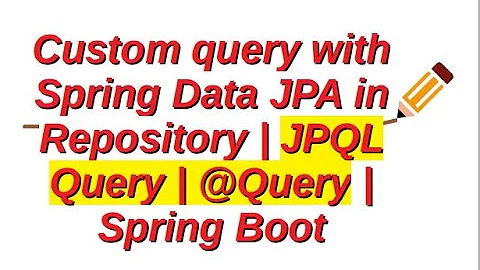JPA/JPQL Query and Foreign Keys
CustomerId is an Entity, not an Integer which is why you are getting the exeption. Pass in the entity you want, or change the query to:
SELECT w FROM WorkEntry w WHERE w.customerId.customerId = 1
Related videos on Youtube
Jamie Studzinski
Updated on June 04, 2022Comments
-
Jamie Studzinski almost 2 years
I'm trying to run a query where I get specific Work done by a Customer based of their id. I'm having troubles making a queue with
JPQLthat will actually retrieve all the data based on the foreign key of thecustomerId.I've tried
SELECT w FROM WorkEntry w WHERE w.customerId = 1and that doesn't work. Every time I try to run it using the Persistence Unit testing I get the following error:java.lang.IllegalArgumentException: An exception occurred while creating a query in EntityManager: Exception Description: Problem compiling [SELECT w FROM WorkEntry w WHERE w.customerId = 1]. [14, 23] The abstract schema type 'WorkEntry' is unknown. [32, 44] The state field path 'w.customerId' cannot be resolved to a valid type. at org.eclipse.persistence.internal.jpa.EntityManagerImpl.createQuery(EntityManagerImpl.java:1605)
I'm wondering what I am missing? I'm fairly new to
JPAandJPQL.This is the customer class:
@Entity @Table(name = "customer") @XmlRootElement @NamedQueries({ @NamedQuery(name = "Customer.findAll", query = "SELECT c FROM Customer c"), @NamedQuery(name = "Customer.findByCustomerId", query = "SELECT c FROM Customer c WHERE c.customerId = :customerId"), @NamedQuery(name = "Customer.findByFirstName", query = "SELECT c FROM Customer c WHERE c.firstName = :firstName"), @NamedQuery(name = "Customer.findByLastName", query = "SELECT c FROM Customer c WHERE c.lastName = :lastName"), @NamedQuery(name = "Customer.findByStreetAddress", query = "SELECT c FROM Customer c WHERE c.streetAddress = :streetAddress"), @NamedQuery(name = "Customer.findByCity", query = "SELECT c FROM Customer c WHERE c.city = :city"), @NamedQuery(name = "Customer.findByState", query = "SELECT c FROM Customer c WHERE c.state = :state"), @NamedQuery(name = "Customer.findByPostalCode", query = "SELECT c FROM Customer c WHERE c.postalCode = :postalCode"), @NamedQuery(name = "Customer.findByPhoneNumber", query = "SELECT c FROM Customer c WHERE c.phoneNumber = :phoneNumber"), @NamedQuery(name = "Customer.findByEmail", query = "SELECT c FROM Customer c WHERE c.email = :email")}) public class Customer implements Serializable { private static final long serialVersionUID = 1L; @Id @GeneratedValue(strategy = GenerationType.IDENTITY) @Basic(optional = false) @Column(name = "customer_id") private Integer customerId; @Size(max = 75) @Column(name = "first_name") private String firstName; @Size(max = 75) @Column(name = "last_name") private String lastName; @Size(max = 250) @Column(name = "street_address") private String streetAddress; @Size(max = 50) @Column(name = "city") private String city; @Size(max = 50) @Column(name = "state") private String state; @Size(max = 45) @Column(name = "postal_code") private String postalCode; @Size(max = 45) @Column(name = "phone_number") private String phoneNumber; // @Pattern(regexp="[a-z0-9!#$%&'*+/=?^_`{|}~-]+(?:\\.[a-z0-9!#$%&'*+/=?^_`{|}~-]+)*@(?:[a-z0-9](?:[a-z0-9-]*[a-z0-9])?\\.)+[a-z0-9](?:[a-z0-9-]*[a-z0-9])?", message="Invalid email")//if the field contains email address consider using this annotation to enforce field validation @Size(max = 250) @Column(name = "email") private String email; @OneToMany(mappedBy = "customerId") private Collection<ExpenseEntry> expenseEntryCollection; @OneToMany(mappedBy = "customerId") private Collection<WorkEntry> workEntryCollection; public Customer() { } public Customer(Integer customerId, String firstName, String lastName, String streetAddress, String city, String state, String postalCode, String phoneNumber, String email) { this.customerId = customerId; this.firstName = firstName; this.lastName = lastName; this.streetAddress = streetAddress; this.city = city; this.state = state; this.postalCode = postalCode; this.phoneNumber = phoneNumber; this.email = email; } public Customer(String firstName, String lastName, String streetAddress, String city, String state, String postalCode, String phoneNumber, String email) { this.firstName = firstName; this.lastName = lastName; this.streetAddress = streetAddress; this.city = city; this.state = state; this.postalCode = postalCode; this.phoneNumber = phoneNumber; this.email = email; } public Customer(Integer customerId) { this.customerId = customerId; } public Integer getCustomerId() { return customerId; } public void setCustomerId(Integer customerId) { this.customerId = customerId; } public String getFirstName() { return firstName; } public void setFirstName(String firstName) { this.firstName = firstName; } public String getLastName() { return lastName; } public void setLastName(String lastName) { this.lastName = lastName; } public String getStreetAddress() { return streetAddress; } public void setStreetAddress(String streetAddress) { this.streetAddress = streetAddress; } public String getCity() { return city; } public void setCity(String city) { this.city = city; } public String getState() { return state; } public void setState(String state) { this.state = state; } public String getPostalCode() { return postalCode; } public void setPostalCode(String postalCode) { this.postalCode = postalCode; } public String getPhoneNumber() { return phoneNumber; } public void setPhoneNumber(String phoneNumber) { this.phoneNumber = phoneNumber; } public String getEmail() { return email; } public void setEmail(String email) { this.email = email; } @XmlTransient public Collection<ExpenseEntry> getExpenseEntryCollection() { return expenseEntryCollection; } public void setExpenseEntryCollection(Collection<ExpenseEntry> expenseEntryCollection) { this.expenseEntryCollection = expenseEntryCollection; } @XmlTransient public Collection<WorkEntry> getWorkEntryCollection() { return workEntryCollection; } public void setWorkEntryCollection(Collection<WorkEntry> workEntryCollection) { this.workEntryCollection = workEntryCollection; } @Override public int hashCode() { int hash = 0; hash += (customerId != null ? customerId.hashCode() : 0); return hash; } @Override public boolean equals(Object object) { // TODO: Warning - this method won't work in the case the id fields are not set if (!(object instanceof Customer)) { return false; } Customer other = (Customer) object; if ((this.customerId == null && other.customerId != null) || (this.customerId != null && !this.customerId.equals(other.customerId))) { return false; } return true; } @Override public String toString() { return "consultant.billing.entity.Customer[ customerId=" + customerId + " ]"; } }And this is my WorkEntry class:
@Entity @Table(name = "work_entry") @XmlRootElement @NamedQueries({ @NamedQuery(name = "WorkEntry.findAll", query = "SELECT w FROM WorkEntry w"), @NamedQuery(name = "WorkEntry.findByWorkEntryId", query = "SELECT w FROM WorkEntry w WHERE w.workEntryId = :workEntryId"), @NamedQuery(name = "WorkEntry.findByDate", query = "SELECT w FROM WorkEntry w WHERE w.date = :date"), @NamedQuery(name = "WorkEntry.findByHoursWorked", query = "SELECT w FROM WorkEntry w WHERE w.hoursWorked = :hoursWorked")}) public class WorkEntry implements Serializable { private static final long serialVersionUID = 1L; @Id @GeneratedValue(strategy = GenerationType.IDENTITY) @Basic(optional = false) @Column(name = "work_entry_id") private Integer workEntryId; @Column(name = "date") @Temporal(TemporalType.DATE) private Date date; // @Max(value=?) @Min(value=?)//if you know range of your decimal fields consider using these annotations to enforce field validation @Column(name = "hours_worked") private Double hoursWorked; @JoinColumn(name = "activity_id", referencedColumnName = "activity_id") @ManyToOne private Activity activityId; @JoinColumn(name = "customer_id", referencedColumnName = "customer_id") @ManyToOne private Customer customerId; public WorkEntry() { } public WorkEntry(Date date, Double hoursWorked, Customer customerId, Activity activityId) { this.date = date; this.hoursWorked = hoursWorked; this.activityId = activityId; this.customerId = customerId; } public WorkEntry(Integer workEntryId) { this.workEntryId = workEntryId; } public Integer getWorkEntryId() { return workEntryId; } public void setWorkEntryId(Integer workEntryId) { this.workEntryId = workEntryId; } public Date getDate() { return date; } public void setDate(Date date) { this.date = date; } public Double getHoursWorked() { return hoursWorked; } public void setHoursWorked(Double hoursWorked) { this.hoursWorked = hoursWorked; } public Activity getActivityId() { return activityId; } public void setActivityId(Activity activityId) { this.activityId = activityId; } public Customer getCustomerId() { return customerId; } public void setCustomerId(Customer customerId) { this.customerId = customerId; } @Override public int hashCode() { int hash = 0; hash += (workEntryId != null ? workEntryId.hashCode() : 0); return hash; } @Override public boolean equals(Object object) { // TODO: Warning - this method won't work in the case the id fields are not set if (!(object instanceof WorkEntry)) { return false; } WorkEntry other = (WorkEntry) object; if ((this.workEntryId == null && other.workEntryId != null) || (this.workEntryId != null && !this.workEntryId.equals(other.workEntryId))) { return false; } return true; } @Override public String toString() { return "consultant.billing.entity.WorkEntry[ workEntryId=" + workEntryId + " ]"; } }-
BadZen almost 9 years"it doesn't work". Please be more specific.
-
Jamie Studzinski almost 9 yearsEvery time I try to run it using the Persistence Unit testing I get the following error: java.lang.IllegalArgumentException: An exception occurred while creating a query in EntityManager: Exception Description: Problem compiling [SELECT w FROM WorkEntry w WHERE w.customerId = 1]. [14, 23] The abstract schema type 'WorkEntry' is unknown. [32, 44] The state field path 'w.customerId' cannot be resolved to a valid type. at org.eclipse.persistence.internal.jpa.EntityManagerImpl.createQuery(EntityManagerImpl.java:1605)
-
Neil Stockton almost 9 yearsso if WorkEntry "is not known" then concentrate on making it known rather than looking at the query. Namely look at your persistence.xml (the way a JPA implementation knows about entities)
-
Jamie Studzinski almost 9 yearsI've got other queries to work with WorkEntry
-
 Michael Tontchev almost 9 yearsCan you tell us which ones?
Michael Tontchev almost 9 yearsCan you tell us which ones?
-
-
Jamie Studzinski almost 9 yearsThat worked thank you Is there a way to just pass in a Customer Entity into a JPQL query?





